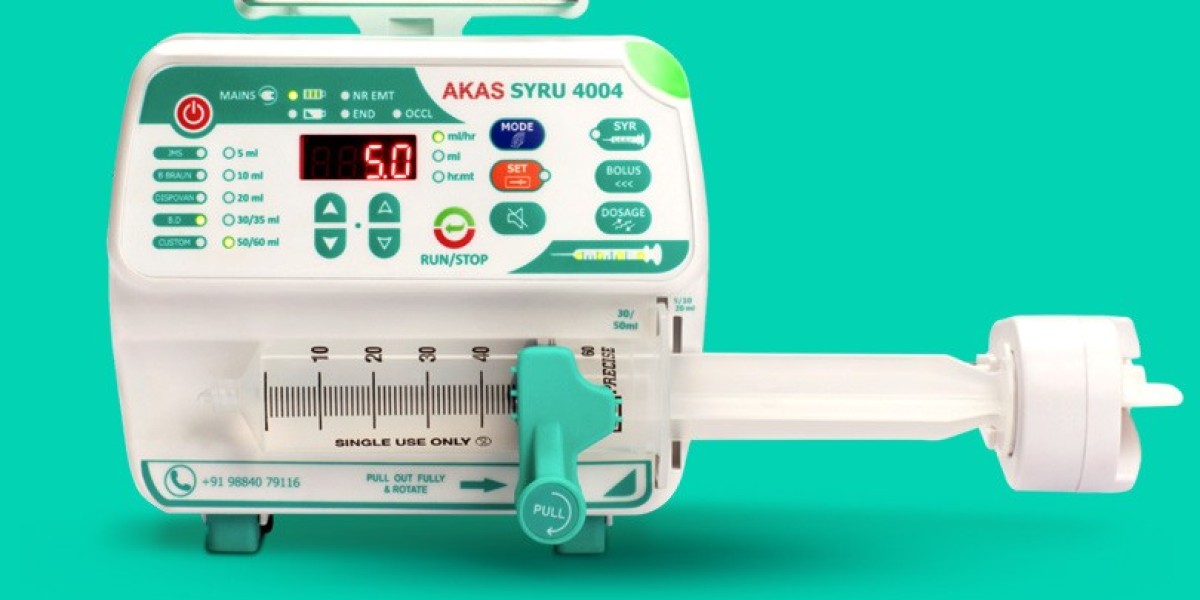Introduction
In modern healthcare, precise medication delivery is essential for optimal patient care. Syringe infusion pumps, integral to many medical settings, have evolved significantly over the years. These devices have become indispensable for administering accurate doses of medication, ensuring patient safety, and improving treatment outcomes. With this growing demand for reliable and advanced technology, syringe infusion pump suppliers have played a critical role in shaping healthcare delivery systems.
This evolution has been driven by advancements in technology, regulatory changes, and the rising need for customized care. As the landscape of modern healthcare continues to change, it’s essential to understand how syringe infusion pump suppliers have adapted to meet the needs of hospitals and medical institutions.
The Early Days of Syringe Infusion Pumps
Basic Mechanisms for Drug Delivery
Early syringe infusion pumps were relatively simple devices. They relied on basic mechanisms to administer medications at a steady rate, often using manual adjustments. Hospitals primarily used these pumps in controlled environments like ICUs, where precise drug administration was necessary.Limited Customisation
The first generations of infusion pumps offered limited options for customization. This lack of flexibility made it challenging for healthcare providers to tailor treatment regimens for individual patients, which was a significant limitation in patient care.Reliability Concerns
In their early stages, syringe infusion pumps faced issues related to reliability. They were prone to malfunctions, which could lead to inaccurate dosages and potential patient safety risks. However, these early models laid the groundwork for the more sophisticated systems we have today.
Technological Advancements and the Role of Syringe Infusion Pump Suppliers
The Rise of Digital Precision
As technology advanced, syringe infusion pumps became more precise. Digital interfaces replaced manual controls, allowing healthcare professionals to set medication delivery parameters with greater accuracy. This development marked a significant leap forward in ensuring patients received the correct doses.Integration with Electronic Health Records (EHR)
Modern syringe infusion pumps can now integrate seamlessly with Electronic Health Records (EHR). This allows for real-time monitoring of medication delivery, reducing human error and enhancing the accuracy of treatment regimens. The ability to track and adjust medication delivery through a centralized system has been a game-changer for hospitals.Smart Syringe Infusion Pumps
Today’s syringe infusion pumps are smart devices, featuring advanced algorithms that can adjust dosages based on patient feedback and clinical data. These pumps are equipped with sensors that detect potential issues such as blockages or air in the line, which reduces the risk of medication errors.Battery Life and Portability
One of the most significant improvements in recent years has been the development of portable syringe infusion pumps. These devices offer extended battery life, making them suitable for use in various medical settings, from operating rooms to patient homes. Their portability has made them invaluable for home healthcare services and mobile medical units.
Regulatory Changes Shaping the Industry
Increased Focus on Patient Safety
Regulatory bodies, including the FDA and ISO, have imposed stringent safety standards on syringe infusion pump suppliers. These standards ensure that devices meet the highest safety requirements, which is crucial for preventing adverse events related to medication delivery. Today’s suppliers are held to these rigorous standards to guarantee that pumps are both effective and safe for use in hospitals and other medical facilities.Enhanced Performance Metrics
As part of the regulatory changes, syringe infusion pump suppliers are now required to provide more detailed performance data, including accuracy rates, alarm systems, and overall device reliability. These metrics help hospitals and medical institutions make informed decisions about which devices best suit their needs.Global Compliance
With the global nature of healthcare, syringe infusion pump suppliers must now comply with international regulations and certifications. This has led to greater consistency in product quality across borders, making it easier for hospitals around the world to access the same high standards of care.
The Shift Towards Personalised Medicine and Customization
Adapting to Diverse Patient Needs
In recent years, there has been a strong shift towards personalized medicine, which requires infusion pumps to be highly adaptable. Syringe infusion pump suppliers have responded by offering customizable devices that can be tailored to individual patients' needs. These customizations include variable infusion rates, volume limits, and programming options for different drug protocols.Pumps for Specific Medical Areas
Different medical specialties have different requirements for infusion pumps. Syringe infusion pump suppliers now offer pumps specifically designed for paediatrics, oncology, anaesthesia, and critical care. This specialized approach allows healthcare providers to choose pumps that are most suited to the needs of their patients, enhancing both safety and treatment efficacy.Advanced Drug Delivery Capabilities
Today’s infusion pumps can support a wide range of medications, from small molecules to biologics, and they provide precise control over the delivery process. Syringe infusion pump suppliers have adapted their designs to accommodate complex drug regimens and new treatment protocols, making them indispensable in modern healthcare.
The Importance of Reliability and Support in Syringe Infusion Pump Suppliers
Minimizing Downtime
In hospital settings, downtime due to equipment failure can be critical. Syringe infusion pump suppliers now prioritize reliability, with many offering extensive warranties and robust after-sales support. These services ensure that hospitals can rely on their pumps for continuous, uninterrupted care.Training and Support Services
To ensure that medical staff can fully utilize infusion pumps, suppliers now offer comprehensive training programs. These programs teach healthcare professionals how to operate pumps effectively, troubleshoot issues, and optimize medication delivery. Suppliers also provide ongoing support to address any technical problems that may arise.Collaboration with Hospitals
Many syringe infusion pump suppliers work closely with hospitals to understand their unique needs. By collaborating with healthcare providers, suppliers can offer customized solutions and ensure that hospitals have the right equipment to meet their patients' needs.
Conclusion:
As technology continues to advance, the role of syringe infusion pump suppliers in modern healthcare will only become more critical. The ongoing evolution of these devices, driven by technological advancements, regulatory changes, and the growing demand for personalized care, will continue to shape the future of healthcare delivery.
Suppliers who prioritize innovation, reliability, and patient safety will be at the forefront of this evolution. Hospitals and medical institutions must choose partners who are not only capable of providing the latest in infusion pump technology but also offer strong customer support and adaptability.
In this regard, Akas Infusion is a notable manufacturer of world-class drug delivery devices, including volumetric infusion pumps, which are trusted for their precision, durability, and reliability in critical care environments.








